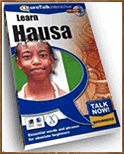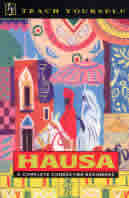

Table Of Contents
Last Updated
Hausa Language Dictionary Translation
which includes Tribe & Culture
Hausa language is a major world language with more first language speakers than any
other sub-sahara African language. An estimated 35-40 million or more.
Most of whom live in Northern Nigeria, West Africa and in southern areas of the neighbouring
Republic of Niger, where Hausa language represents the majority language.
The Hausa speaking area consists of the historical Emirates of, inter alia, Kano, Katsina,
Daura, Zaria and Gobir.
All of which were added into the Sokoto Caliphate following the Fulani led Jihad and conquest in the early 19th century.
As a result of this historical connection, mother tongue speakers of Hausa language include
many ethnic Fulani. The start of hausa language translation.
Hausa Language Translation
Hausa is also spoken by dispora communities of traders, Muslim scholars and immigrants in urban areas of West Africa. For example, Southern and Central Nigeria, Benin, Burkino Faso, Cameroon, (northern) Ghana and Togo.
Traders mainly trade using english hausa translation or hausa english translation in all their business.
As well as the Blue Niger Province and Western regions of the Sudan.
Hausa language speaking colonies are also to be found in large cities in North Africa, for example, Tripoli (Libya), Equatorial Africa, e.g. Brazzaville (Congo) and Bangui (Central Africa Republic).
It is the most important and wide spread West African language, rivalled only by Swahili as an African lingua franca, and has expanded quickly as a first or second language, especially in northern Nigeria.
Hausa is used extensively in commercial, government and educational spheres, and in the mass media.
There are several Hausa Language newspapers (also hausa translator), including Gaskiya Ta Fi Kwabo ("Truth is Worth More than a Penny"), published twice a week in Kaduna State, northern Nigeria. Also, book publishing is active.
Both the Bible and the Koran are available in Hausa language.
Many radio stations, both African and international,broadcast in (mainly Kano) Hausa, including BBC World Service, Voice of America, Deutsche Welle, China Radio International, and (until the early 1990s) Radio Moscow.
Hausa is also used extensively for televison production in Nigeria and Niger, and there is a growing Hausa Music Hausa Songs and Hausa Video industries. Together with Igbo and Yoruba languages, the Nigerian Constitution officially recognizes Hausa as a national language.
A number of universities in Nigeria and Niger offer undergraduate and postgraduate degree courses in Hausa, and there are also specialists in Hausa language and/or literature involved in comparable programmes at universities in United States of America (USA), Europe, Japan, China and South Korea.
Hausa language is a member of the West branch of the Chadic language family, which contains over 100 distinct languages spoken to the East, West and South of Lake Chad.
Chadic is a branch of the Afroasiatic super family, the other branches being Ancient Egyptian (extinct), Berber (e.g. Tamahaq, Tamazight), Cusitic (e.g. Somali, Oromo), Omotic (e.g. Wolaytta), and Semitic (e.g. Arabic, Hebrew,Amharic).
Although the inclusion of Hausa and Chadic within Afroasiatic was first proposed almost 150 years ago, it has only recently been generally accepted as fact. There are a number of media translate to hausa, therefore, hausa english translation.
Various regional based Hausa dialects display variation in tone, lexicon and grammatical morphemes, and dialectal forms are noted throughout the grammar when relevant to the discussion in hand.
Although detailed comprehensive information is lacking, it is possible to differenciate broadly between Eastern dialects on the one hand, for example, Kano and contiguous areas to the South (Zaria), Southeast (Bauchi) and North (Dausa), and Western dialects on the other, e.g. Sokoto, Gobir and northwards into Niger.
Intermediate varieties include Katina and Maradi Hausa. Kano City in northern Nigeria, is the largest Hausa speaking city with a population of several million.
Kano hausa is considered quot;standard",and is the variety normal used in the print and broadcasting media, as well as in hausa grammars, hausa dictionaries, hausa translation and teaching manuals.
Hausa language is one of the best documented and most extensively research of all subSahara African Languages, and has been the subject of serious study for 150 years.
Grammar of the Hausa Language
Gender Distinction
With Gender distinction, the Hausa language is different from most of the African languages, as regards with the distinction of gender.
Almost all of them know of no distinction except a physical one, therefore, where it exists in nature, and then it is invariably expressed by different words:
But the Hausa has developed a Feminine to a much greater extent, as seen in the course of the grammar of the hausa language or translate hausa.
A careful consideration of this, and of many other peculiarities, seem to indicate the Semitic origin of the hausa.
The method by which the Gender is distinguished by the termination in a, and the use of ta, to denote the feminine gender, appear to point even mre distinctly to the semitic origin (ta kirrata, She called her).
There are but two genders in the hausa language, which is the Masculine and the Feminine. They are distinguished and expressed in three different ways:
- By using different words, especially where gender exists in nature, and which may be called the physical
distinction as:
Haus Masculine or Feminine Is Haus Feminine? Oba, 'Father' Uwa, 'Mother' Wa, 'Elder brother' Ya or Iya, 'Elder sister Kane, 'Younger brother' Kanua, 'Younger sister' Mutum '(mortal) Man' Matse, 'Woman' Rakumi, 'Camel' Tagua, 'Female camel' Bunsuru, 'He-goat' Akwia, 'She-goat' Doki, 'Horse' Godia, 'Mare' Zakkara, 'Cock' Kasa or kaza, 'Hen' Basimi,and Takarikari, 'Bull' Sania, 'Cow' Rago, 'Ram' Dumkia or tumkia, 'Sheep' Sarmayi, 'Youth' Budurua, 'Maid' Ango, 'Bridegroom' Amaria, 'Bride' Toro, 'The male' Glwa, 'The female elephant' Obangisi, 'Master' Uworigidda or Uworigisia, 'Mistress of the house'
- The Gender is distinguished by additional words, such as namely:
Haus Masculine or Feminine Is Haus Feminine? Misi or Nadmisi, 'Male' Matse, 'Female' Da namisi, 'Male child - boy' Dia matse, 'Female child - girl' Da n zaki, '(masc.) a lion's whelp, a young lion' Da n zakainya, '(fem.) a lion's whelp, a young lion' Namisi n gado, 'Boar' Matse n gado, 'Sow' Da n uwa, 'Mother's child - brother' Dia uwata, 'Mother's daughter - sister'
- The gender is distinguished by different terminations. The masculine may end in any vowel, but the characteristic
termination of the feminine is a, which is inflenced by the Euphonical laws, may be
ia, ania or unia. For example:
Haus Masculine or Feminine Is Haus Feminine? Babe, 'Locust' Babania, 'Locust' Mutum or mutume, 'Man' Mutumnia, 'Woman' Sariki, 'King' Saraunia, 'Queen' Yaro, 'Boy' Yarinia, 'Girl' Da, 'Son' Dia, 'Daughter' Kane, 'Young brother' Kanua, 'Young sister' Sa, 'Bull' Sania, 'Cow' Maraki, 'Calf' Maraka, 'Calf' Barao, 'Thief' Baraunia, 'Thief' Karre, 'Dog' Karia or kariya, 'Bitch' Bara, 'Male' Barania, 'Female servant' Mayi, 'Wizard' Mayia, 'Witch' Sariri, 'Infant' Sariria, 'Infant' Zofo, 'Old man' Zofua, 'Old woman' Gado, 'Pig' Gadonia, 'Sow' Alfadari, 'Mule' Alfadara, 'Mule' Goburo, 'Widower' Goburania, 'Widow' Anabi, 'Prophet' Anbia, 'Prophetess'

